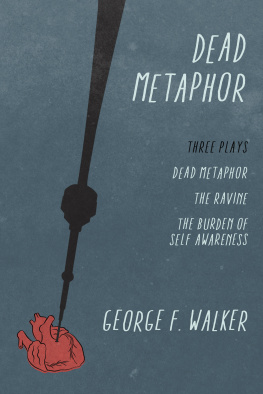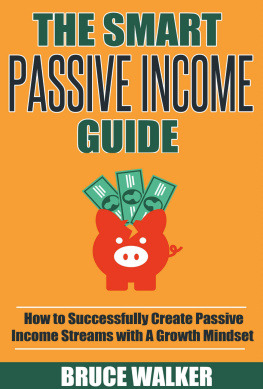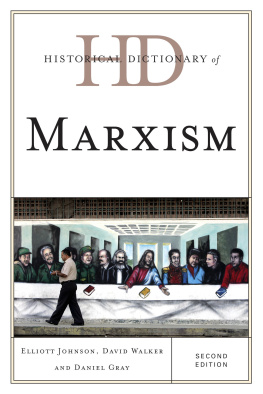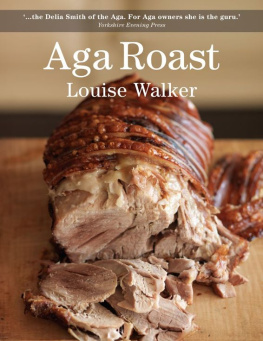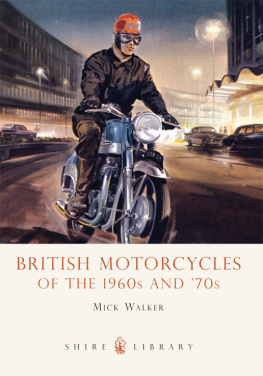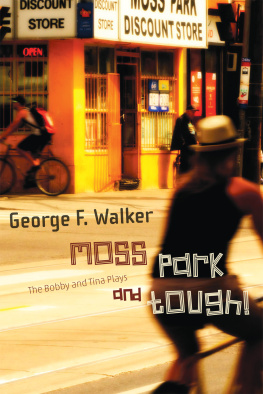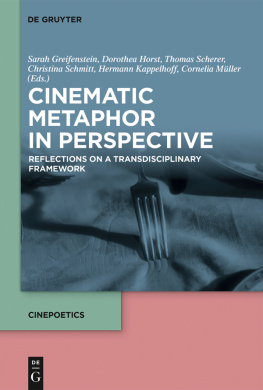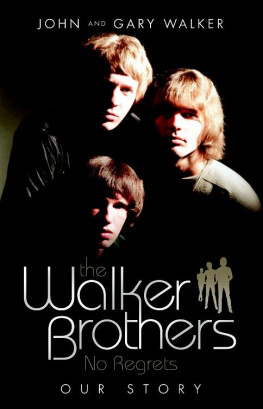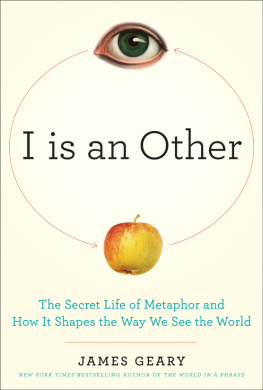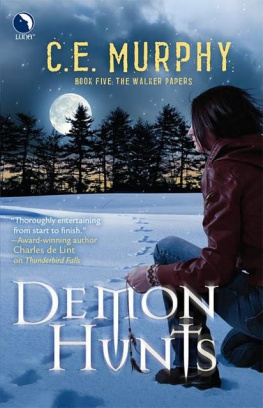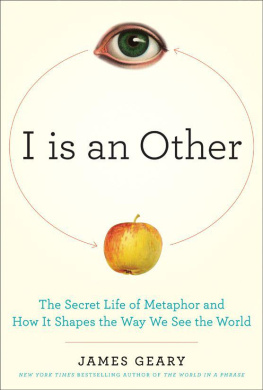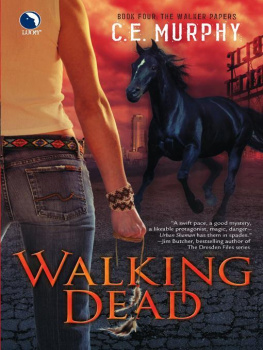Walker - Dead Metaphor: Three Plays
Here you can read online Walker - Dead Metaphor: Three Plays full text of the book (entire story) in english for free. Download pdf and epub, get meaning, cover and reviews about this ebook. City: New York, year: 2015, publisher: Talonbooks, genre: Detective and thriller. Description of the work, (preface) as well as reviews are available. Best literature library LitArk.com created for fans of good reading and offers a wide selection of genres:
Romance novel
Science fiction
Adventure
Detective
Science
History
Home and family
Prose
Art
Politics
Computer
Non-fiction
Religion
Business
Children
Humor
Choose a favorite category and find really read worthwhile books. Enjoy immersion in the world of imagination, feel the emotions of the characters or learn something new for yourself, make an fascinating discovery.
- Book:Dead Metaphor: Three Plays
- Author:
- Publisher:Talonbooks
- Genre:
- Year:2015
- City:New York
- Rating:3 / 5
- Favourites:Add to favourites
- Your mark:
- 60
- 1
- 2
- 3
- 4
- 5
Dead Metaphor: Three Plays: summary, description and annotation
We offer to read an annotation, description, summary or preface (depends on what the author of the book "Dead Metaphor: Three Plays" wrote himself). If you haven't found the necessary information about the book — write in the comments, we will try to find it.
Dead Metaphor: Three Plays — read online for free the complete book (whole text) full work
Below is the text of the book, divided by pages. System saving the place of the last page read, allows you to conveniently read the book "Dead Metaphor: Three Plays" online for free, without having to search again every time where you left off. Put a bookmark, and you can go to the page where you finished reading at any time.
Font size:
Interval:
Bookmark:
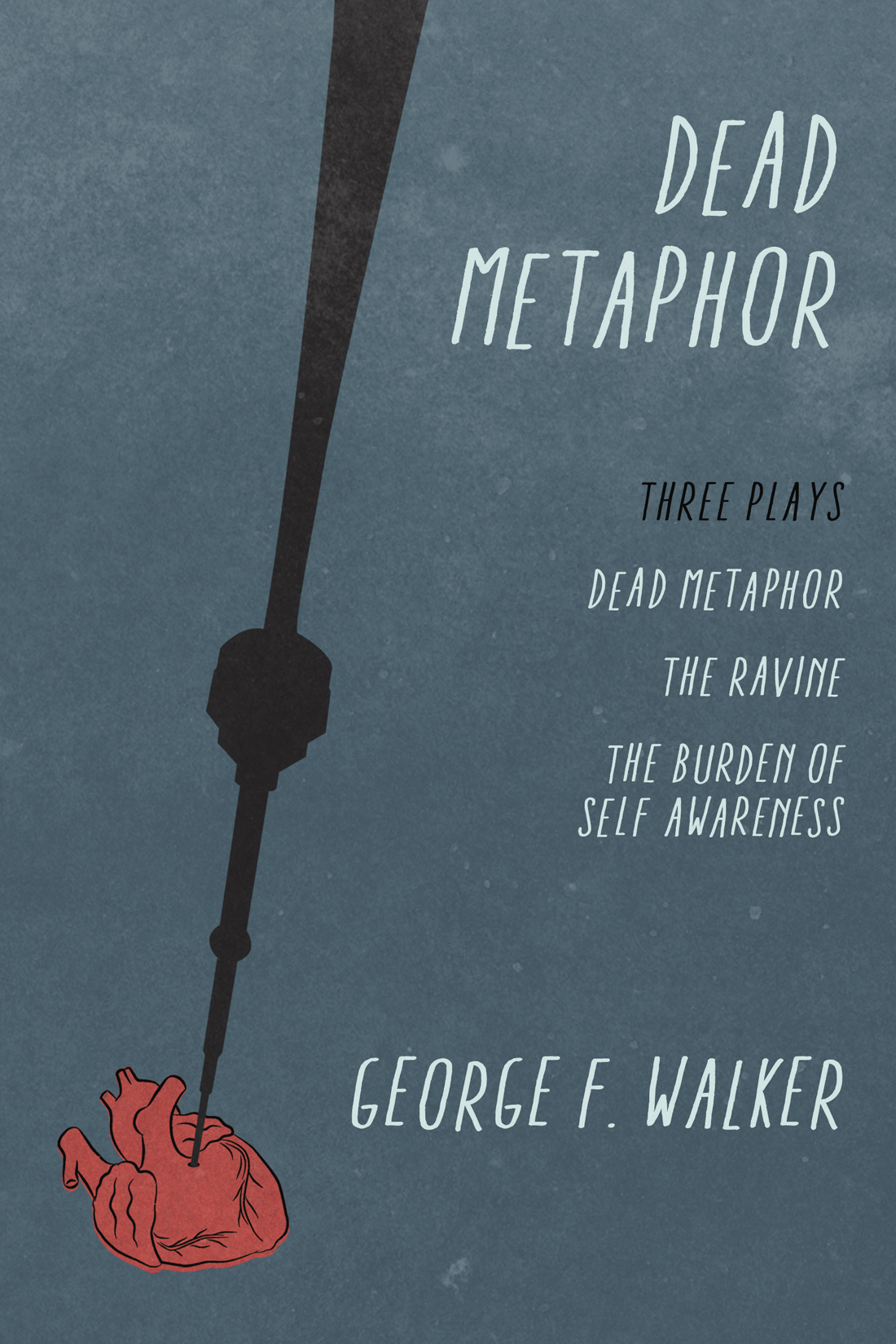
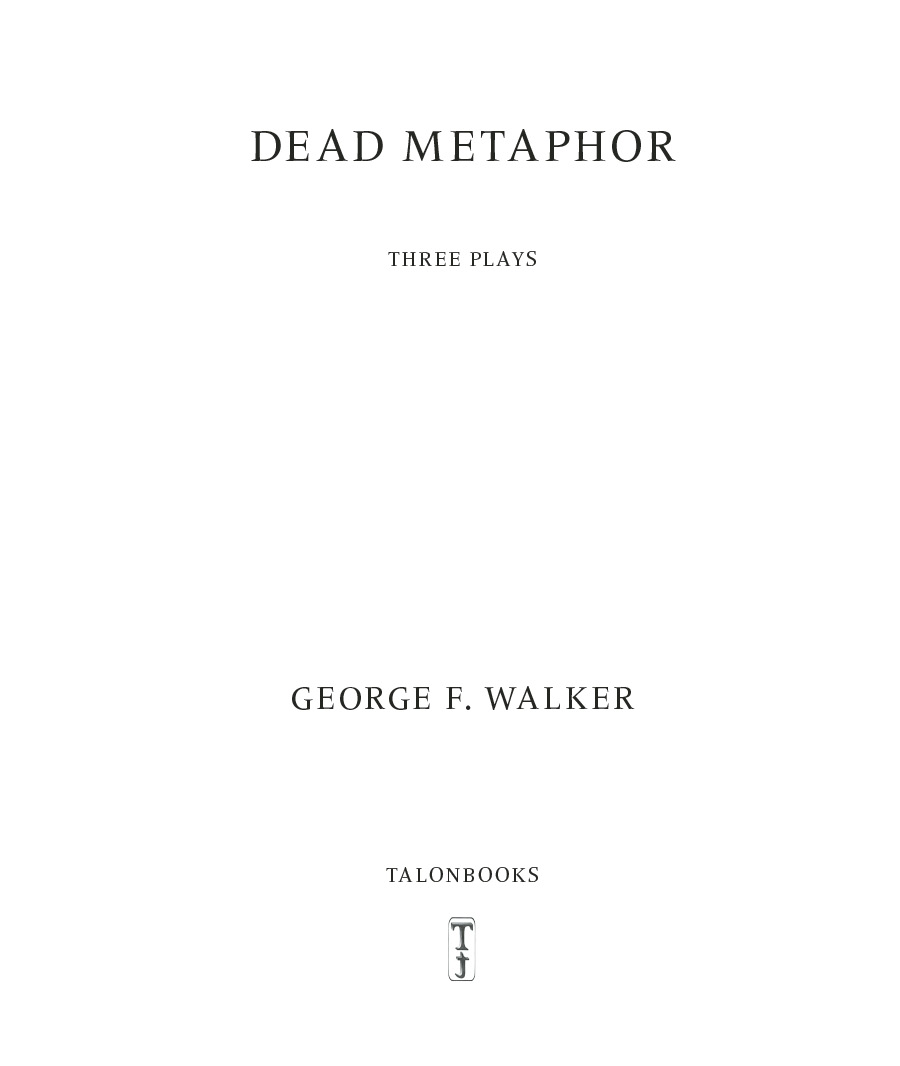
These new plays, equally giddy and ferocious, tackle similar themes. After more than four decades Walker remains what critic Richard Ouzounian called him in a rave review of Dead Metaphor : Canadas angriest and funniest playwright. What makes him angry? Greed, blind ambition, venal politicians, social Darwinism, religious hypocrisy, clichs, and stupidity, among other things. And whats so funny? You name it. Walkers theatre is une comdie humaine . His people act absurdly because theyre people.
Self-awareness, when it comes, doesnt necessarily cause them to behave more astutely or understand things more acutely. And if it does, dont expect them to express themselves politely. Since I got my iPhone, pragmatic hooker Lianne says in The Burden of Self Awareness , I can suck cocks and read about things at the same time. What she reads has taught her that redistributing rich peoples money can make a difference in the lives of the troubled and destitute. Though Walkers characters may be vulgar, anxious, or deluded, only rarely are they paralyzed by their own absurdity. When in doubt they do something.
Often it involves picking up a gun or hiring someone whos packing. They have major concerns about accountability. The prevalence of guns in these plays might suggest an American setting but Walker never identifies his cities by name or region, much less nationality, and his work consistently speaks to audiences on both sides of the border. The treatment of veterans coming home from our twenty-first century wars is a significant issue in both countries; Dean, the sniper just returned from Afghanistan in Dead Metaphor , could as easily be Canadian as American. The Tea Party-ish politics of Helen in that play (running for Congress? Parliament?) may sound American teaching Intelligent Design doesnt get much traction in Canada but her positions on patriotism, gun ownership, taxes, attack ads, and climate change would not be out of place at a Conservative Party rally. The Ravine points obliquely in the direction of Walkers hometown of Toronto and the rantings of its recent mayor (those elitist bastards) but the campaign rhetoric has a distinct cross-border ring: I dont have ideas, I have beliefs.
I believe in the taxpayer. Walker is a satirical free trader, an equal opportunity social critic. Many of the central elements of Dead Metaphor repeat themselves in the other two plays. The innocents who try to remain hopeful in a corrupt world, Dean in this case, turn out to be not quite as innocent as they seem. The outspokenness of apparent truth-tellers like Hank, Deans father, may result from brain damage or mental illness. Women drive the baroque plots, partly from a biological imperative (pregnancy powerfully motivates Deans wife, Jenny, as it does Lesley in The Ravine ), but generally because, like Helen, they are simply more ambitious, ruthless, greedy, and amoral than the men.
Deans mother, Frannie, is the exception. Revenge schemes beget ironic reversals, counterplots, and confusions. Yet something gets done at the end, more sobering in Dead Metaphor than in The Ravine or The Burden of Self Awareness . Certain logical patterns play themselves out. Cassie, the antagonist of The Ravine , is another cynical, ambitious, political animal, mayoral candidate Oscars campaign manager. She meets her match in a different kind of powerful woman: Michele from the homeless camp, a classic Walker character.
Marginalized, possibly deranged, and deeply entangled in her own issues, Michele nevertheless has a utopian vision of society that demands accountability and includes things like universal daycare and a total revamp of the mental health situation as it relates to the criminal justice system. She manages to attain some leverage, possibly, but only after a great deal of carnage, comic and otherwise. Like former Army sniper Dean, many characters in these plays are transitioning from something they just were, trying to figure out how to be what they have become or to become something else. The Ravine s Cassie is an ex-prosecutor, skip tracer Finn an ex-con. In The Burden of Self Awareness , escort Lianne is a recent college student, a history major. Once a news anchor, Phil became a private eye (to live a life that was as sleazy as I felt).
Stan, the worlds worst shrink, is becoming a mental case. Rich Judy violently resists turning into a poor person as her anxious husband, Michael, tries to give away his inherited money to stop feeling inauthentic. Some of these characters end badly. Others find outlandish comic escape. A few even get away with murder. This is Walkers world, comedy with a bang.
And a social conscience. Jerry Wasserman DEAD METAPHOR PRODUCTION HISTORY Dead Metaphor premiered at San Franciscos American Conservatory Theater on March 9 to 24, 2013, with the following cast and crew: DEAN: George Hampe OLIVER: Anthony Fusco JENNY: Rebekah Brockman HANK: Tom Bloom FRANNIE: Sharon Lockwood HELEN: Ren Augesten Director: Irene Lewis Set Designer: Christopher Barreca Lighting Designer: Alexander V. Nichols Sound Designer: Cliff Caruthers Costume Designer: Lydia Tanji The Canadian premiere of Dead Metaphor was produced by Canadian Repertory Theatre and performed at the Panasonic Theatre in Toronto from May 20 to June 8, 2014, with the following cast and crew: DEAN: Noah Reid OLIVER: Michael Healey JENNY: Haley McGee HANK: Eric Peterson FRANNIE: Julie Stewart HELEN: Nancy Beatty Director: George F. Walker Producer: Ken Gass Presenter: David Mirvish Set and Costume Designer: Shawn Kerwin Lighting Designer: Rebecca Picherack Sound Designer: Robin Johnston Associate Director: Jennifer Brewin Stage Manager: Crystal Salverda Assistant Stage Manager: Kevin Olson SETTING Various locations, all just suggested CHARACTERS Dean Trusk , a returned soldier, age twenty-seven OLIVER DENNY , an employment counsellor, age forty-five JENNY TRUSK , Deans wife, age twenty-seven HANK TRUSK , Deans father, age seventy FRANNIE TRUSK , Deans mother, age sixty-six HELEN DENNY , Olivers wife, age forty-five
- SCENE 1 Employment office. OLIVER Denny is behind his desk interviewing D EAN Trusk . OLIVER: So where do you see yourself in five years? D EAN: Pardon? OLIVER: What do you see yourself doing? DEAN: Whatever I can, I guess.
OLIVER: Whats that mean? DEAN: Well whatever job I can get and, you know, keep... Ill be doing that. Unless Im doing something else. OLIVER: Something else instead of... ? DEAN: Whatever job I get... now.
OLIVER: Okay but... nothing specific? D EAN: Pardon? OLIVER: Its just that the question, Where do you see yourself in five years is really meant to elicit from you whatever plan, or even dream you might have for yourself. DEAN: Oh. You mean what would be my favourite thing to do? OLIVER: Yeah... DEAN: Well the guys in my unit thought Id be pretty good at writing those funny things on cards. anniversaries. anniversaries.
Font size:
Interval:
Bookmark:
Similar books «Dead Metaphor: Three Plays»
Look at similar books to Dead Metaphor: Three Plays. We have selected literature similar in name and meaning in the hope of providing readers with more options to find new, interesting, not yet read works.
Discussion, reviews of the book Dead Metaphor: Three Plays and just readers' own opinions. Leave your comments, write what you think about the work, its meaning or the main characters. Specify what exactly you liked and what you didn't like, and why you think so.

